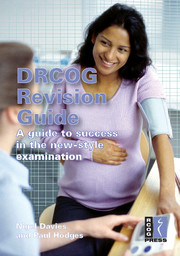Book contents
- Frontmatter
- Contents
- Foreword
- About the authors
- Acknowledgements
- Abbreviations
- 1 Introduction
- 2 The curriculum
- 3 Syllabus
- 4 The new DRCOG examination
- 5 Extended matching questions
- 6 EMQ paper one
- 7 EMQ paper two
- 8 Single best answer (best of five) questions
- 9 Single best answer paper one
- 10 Single best answer paper two
- 11 Multiple choice questions
- 12 MCQ paper one
- 13 MCQ paper two
- 14 Ten tips for candidates
- 15 Answers
- Mock examinations answer sheets (blank)
- Index
11 - Multiple choice questions
Published online by Cambridge University Press: 05 August 2014
- Frontmatter
- Contents
- Foreword
- About the authors
- Acknowledgements
- Abbreviations
- 1 Introduction
- 2 The curriculum
- 3 Syllabus
- 4 The new DRCOG examination
- 5 Extended matching questions
- 6 EMQ paper one
- 7 EMQ paper two
- 8 Single best answer (best of five) questions
- 9 Single best answer paper one
- 10 Single best answer paper two
- 11 Multiple choice questions
- 12 MCQ paper one
- 13 MCQ paper two
- 14 Ten tips for candidates
- 15 Answers
- Mock examinations answer sheets (blank)
- Index
Summary
The DRCOG examination consists of two papers, the second of which is a 40-question MCQ paper with each question having five twigs to be answered True or False in 90 minutes.
There is no negative marking and so it advisable for candidates to answer all the questions, taking a guess at those of which they are unsure.
The paper is standard set and therefore has a variable pass mark, according to the difficulty of the paper and the standard setting principles and procedures described earlier (see Chapter 4).
The next two chapters contains practice papers. We have made every effort to ensure that these questions will be of a standard similar to that which you are likely to encounter in the examination. Once again, it is important to emphasise that the curriculum and syllabus will enable you to focus your learning on those subjects that are relevant to the UK-based GP. It is unlikely that you will be expected to have knowledge relevant to hospital-based practice unless the examiners consider it relevant, in which case it will be included in the curriculum and syllabus. For example, the examiners will not expect you to know the anatomy of the ureter but they may ask a question about the risk of injury to the ureter associated with hysterectomy, since a GP would be expected of to recognise or consider this complication of gynaecological surgery.
- Type
- Chapter
- Information
- DRCOG Revision GuideA Guide to Success in the New-Style Examination, pp. 77 - 78Publisher: Cambridge University PressPrint publication year: 2008

